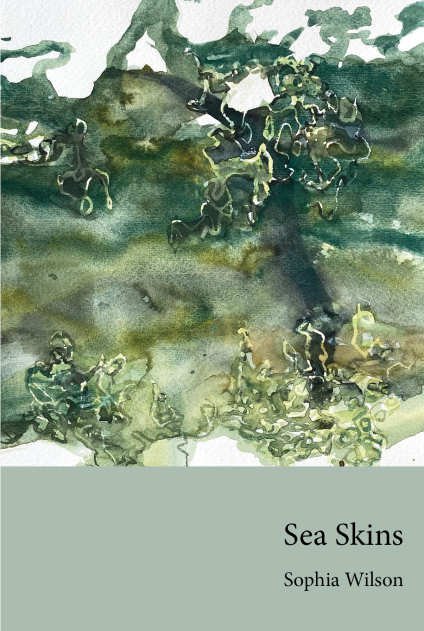Sea Skins

Sea Skins by Sophia Wilson. Flying Islands Books/Cerberus Press (2023). RRP: $10.00 AUD. Pocket pb, 108 pp. ISBN: 978064550320. Reviewed by S J Mannion.
I found myself mouthing the lines many times as I read this pukapuka. A finely scored collection, it seems to me an operetta of sorts, though one with some serious grace notes. And how this book breathes; it gasps, it sighs, and on occasion, it almost yawns. There is such musicality to the words and the work and the well wrought shapes of these poems. They look like songs to me … something about the spaces in between and the way they settle on the page, perhaps. There is such movement and rhythm here, a syncopated style and a sound that catches you in the back of the throat. Swallowing lines like:
‘Now it’s me
beyond the breakers flailing
waiting
for somebody
to turn me around’ (Shoreline, P.25)
The poem ‘Waning’ broke my heart, bit by bit, each line of it, took me back to that intense and merciless scrutiny of the body that teenage girls can also self-impose; that wanting to be anything other than what we were. Self acceptance being so often a hard won prize of a lengthy battle.
‘thirteen: I put my Walkman on, I run
fourteen: I weigh 38 kilograms
fifteen: I circle my body like a scavenger.’ (Waning, P.5)
Then there’s the … cleverness of ‘In the Event of Emergency’ but it’s not just the sophistry – I was tempted to say ‘Sophiaistry’ but there’s just no need for puns, is there? There is, as well, great depth and meaning here, and the piece just works. It is more than ‘the sum of its parts’. I am not one for overtly styled prose but I love this. It’s impossible to quote from owing to the redactions but I will attempt it nonetheless; it may give you some idea of the impact:
‘the fields are full
of orphans
in which
should they’
This resonates still. (P.29)
Oh, there is a lot of language too! Italian, Māori, Chinese, French, Japanese, but I will refrain from polyglottal comment here as I have only a cursory knowledge of but a few. Suffice to say, that these languages (all of them!) they feel good on the tongue and in the mouth, they taste rich and varied, and the reader gets a sense of their meaning by the very sound of them. While obviously open to some misinterpretation, I struggle with thinking it matters here. After all, surely poetry, above all, surely poetry, can be as much about the sheer sound of things as any supposed meaning?
See, here in ‘Huhu’. Hear, here in ‘Huhu’:
‘Ko Huhu, he mōmona, he mā –
kōwiri ana I te rākau koropungapunga.’ (p23)
Language, so melodic and so full of its own self. We can scent or divine a meaning, inherent as sap rising and as life giving.
S J Mannion is an Irish writer living in Christchurch, New Zealand. When she can she writes. When she can’t she reads. In between she ukuleles. She is published widely and variously.